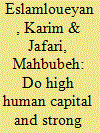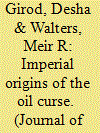| Srl | Item |
| 1 |
ID:
181473


|
|
|
|
|
| Summary/Abstract |
This paper advances research in the resource curse literature in several directions. Firstly, using different measures of oil dependence and abundance, it investigates the validity of the oil curse hypothesis in energy-rich developing countries. Secondly, the paper studies the impact of human capital, institutional quality, and trade openness on the growth of these countries. Thirdly, it examines the interaction effect of human capital and oil dependence/abundance on the growth of oil-rich developing counties. Fourthly, we estimate a set of panel data models by the Generalized Method of Moments (GMM) to address the endogeneity problem. The estimation results confirm the oil curse hypothesis. Furthermore, our findings underscore the significant role of higher human capital, better institutional quality, and trade openness in boosting economic growth. These results are robust to the way the quality of institutions is measured. Moreover, we find a threshold level for human capital above which the oil curse vanishes. Our finding, hence, highlights the crucial role of human capital in offsetting the adverse effect of oil abundance/dependence on output growth. The fact that poor quality of human capital and weak institutions hinder economic growth has important policy implications for social planners and policymakers in oil-rich developing countries.
|
|
|
|
|
|
|
|
|
|
|
|
|
|
|
|
| 2 |
ID:
163230


|
|
|
|
|
| Summary/Abstract |
The literature maintains that oil creates a curse on development in countries with weak national institutions at oil discovery, but offers little guidance on the specific institutions that help leaders avoid the curse. We trace rent distribution in Kuwait and Oman, apparent outliers that experienced development despite their weak national institutions at oil discovery. Unlike other examples of the oil curse, Kuwait and Oman contained a strong informal institution that compelled rulers to spend oil revenues on human development: a balance of power between leaders and their domestic rivals. Because informal balances of power are also present in countries with strong formal institutions that avoid the oil curse, this article suggests that the presence or absence of informal balances of power may help account for whether oil is a blessing or a curse.
|
|
|
|
|
|
|
|
|
|
|
|
|
|
|
|